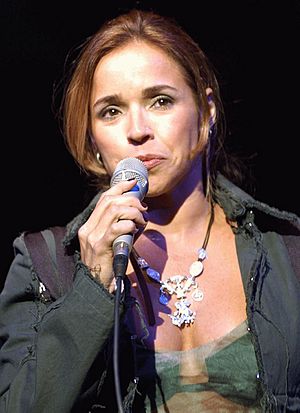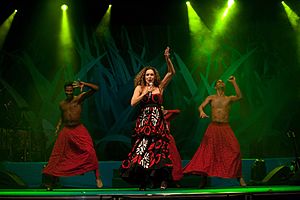Daniela Mercury facts for kids
Quick facts for kids
Daniela Mercury
|
|
|---|---|

Mercury in 2023
|
|
| Background information | |
| Birth name | Daniela Mercuri de Almeida |
| Born | July 28, 1965 Salvador, Bahia, Brazil |
| Genres |
|
| Occupation(s) |
|
| Instruments | Vocals |
| Years active | 1989–present |
| Labels |
|
| Associated acts | Companhia Clic |
Daniela Mercury (born Daniela Mercuri de Almeida on July 28, 1965) is a famous Brazilian singer, songwriter, dancer, and producer. She has sold over 11 million records around the world. Daniela has also had 24 songs reach the Top 10 in Brazil, with 14 of them becoming number one hits!
She won a Latin Grammy for her album Balé Mulato – Ao Vivo. She also received many other awards, including six Brazilian Music Awards.
In 1991, Daniela Mercury released her first album. The next year, her album O Canto da Cidade made her a national star. It also helped make axé music very popular. Over the years, Daniela released many albums. These albums included hit songs like "Swing da Cor", "O Canto da Cidade", "À Primeira Vista", and "Rapunzel".
She recorded a special DVD for Cirque du Soleil's 25th anniversary. She also performed at the Montreal Jazz Festival. Daniela was invited to sing with Paul McCartney in Oslo, Norway. This was during the ceremony for the Nobel Peace Prize.
In 2009, she released her album Canibália and started an international tour. The album featured songs like "Preta" with Seu Jorge. An American writer named Camille Paglia once said that Daniela Mercury was the artist Madonna would want to be like. In 2011, the American TV channel CBS called Daniela Mercury the "Carmen Miranda of the new times."
Contents
Early Life and Dreams
Daniela Mercuri de Almeida was born on July 28, 1965. She was born in Salvador, Bahia, Brazil. Her mother, Liliana Mercuri, had Italian family roots. Her father, António Fernando de Abreu Ferreira de Almeida, was from Portugal.
Daniela grew up in a regular family home in Salvador. She had four siblings: Tom, Cristiana, Vânia, and Marcos. Her sister Vânia also became a singer. When she was a child, Daniela was very lively and was sometimes called "drip-fire."
At eight years old, Daniela started taking dance lessons. She learned classical ballet, jazz, and African dances. When she was 13, she was inspired by the singer Elis Regina. Daniela decided she wanted to be a singer too. She began singing in local bars in 1980. She also performed on a trio elétrico (a large truck with a sound system) during the 1981 carnival. In 1984, she studied dance at the Federal University of Bahia.
Becoming a Star
Starting Out (1984–1990)
From 1986 to 1988, Daniela Mercury was the main singer for the band Cheiro de Amor. By 1988, she was a backup singer for the famous musician Gilberto Gil. In 1989, she recorded two albums as the lead singer of the pop band Companhia Clic. Their songs "Pega que Oh!" and "Ilha das Bananas" became small hits in Bahia. In the early 1990s, Daniela decided to start her solo career.
Rising to Fame (1991–1993)
Daniela's first solo album came out in 1991. It was called Daniela Mercury. The first song from the album, "Swing da Cor", became a number-one hit in Brazil. Another song, "Menino do Pelô", also became a top-ten hit. After this, Daniela decided to produce her own albums. This way, she could control her music.
In 1992, Daniela performed a show called "Som do Meio-Dia" (Midday Sound). It was at the Art Museum of São Paulo (MASP). More than thirty thousand people came to watch!
Soon after, Daniela signed with Sony Music. She released her second solo album, O Canto da Cidade. This album was a huge success. It had four number-one songs: "O Canto da Cidade", "O Mais Belo dos Belos", "Batuque", and "Você Não Entende Nada/Cotidiano". O Canto da Cidade is known for bringing Axé Music to a wider audience in Brazil.
The album also led to a TV special on Rede Globo. It included live performances in Rio de Janeiro. In July 1993, Daniela Mercury performed at the famous Montreux Jazz Festival in Switzerland. Many people believe O Canto da Cidade helped make the Carnival of Bahia even more popular. Daniela became known as "the hurricane of Bahia" and "Queen of the Axé."
Artistic Growth (1994–2000)
In 1994, Daniela released Música de Rua. This album had popular songs like "Música de Rua" and "O Reggae e o Mar." In 1996, Feijão com Arroz was released. Critics liked this album a lot. It is Daniela's second best-selling album. It featured hits such as "À Primeira Vista", "Nobre Vagabundo", and "Rapunzel".
In 1998, Daniela's first live album, Elétrica, came out. It included the popular song "Trio Metal."
Exploring Electronic Music (2000–2004)

In 2000, Daniela Mercury released her fifth studio album, Sol da Liberdade. This album was new for her because it mixed her music with electronic music sounds. It had two number-one songs: "Ilê Pérola Negra" and "Como Vai Você."
The next year, she released Sou de Qualquer Lugar. This album also explored electronic sounds. It featured the number-one song "Mutante."
In 2003, Daniela's second live album, MTV ao Vivo – Eletrodoméstico, was released. It was also her first DVD. Many artists performed with her, including Dulce Pontes and Carlinhos Brown.
In 2004, Carnaval Eletrônico was released. For this album, Daniela invited DJs and electronic music producers from Brazil. It celebrated five years of her TrioTechno, which was the first electronic music trio elétrico in the Bahian Carnaval. The album was nominated for a Latin Grammy.
Back to Basics (2005–2007)
In 2005, Clássica was released. This album showed a new side of Daniela. It featured bossa nova, jazz, and some of her biggest hits. She chose to work independently from record companies to have more control over her music.
That same year, her eighth studio album, Balé Mulato, came out. Critics really liked it. The next year, the live version of Balé Mulato won a Latin Grammy Award.
New Projects (2007–2013)
On November 19, 2007, Daniela released "Preta" with Seu Jorge. This song was very popular during carnival. For the 2009 Carnival, she recorded "Oyá Por Nós" with Margareth Menezes. In 2009, Rolling Stone Brasil magazine named Daniela as one of the 100 greatest Brazilian music artists of all time.
In November 2009, Daniela released the album Canibália. This album was a big project that combined music, dance, video, and visual arts. Daniela said that Canibália was about embracing different Brazilian art forms. It was a way to celebrate Brazil's unique identity.
Her Canibália Tour started in 2009 and traveled to many cities in Brazil and other countries. The show honored Carmen Miranda with songs like "Tico-Tico no Fubá".
For the 2010 Carnival, Daniela Mercury recorded "Andarilho Encantado". This song was released at her special annual show called Pôr do Som (Sunset Sound) in Salvador, Bahia. In 2010, Daniela celebrated 20 years of her solo career.
In February 2013, the singer was interviewed on CNN International's Leading Women program. She was called the "Brazilian Madonna." An American writer, Camille Paglia, also expressed her admiration for Daniela Mercury.
Later in 2013, Daniela released the album Daniela Mercury & Cabeça de Nós Todos. This was a collaboration with the Brazilian group Cabeça de Nós Todos. It was an urban and pop-rock album. It was released with a book called "Daniela and Malu, A Love Story." The book told the story of her relationship with her wife, Malu Verçosa.
Recent Work (2014–Present)
In 2014, Daniela was a mentor on The Voice Kids in Portugal. This was because she was very popular there. In the same year, she released the song "A Rainha do Axé (Rainha Má)". This song is about the strength of women, love, and faith. It was sung by many people during the 2015 Carnival of Salvador. This song was the first from her fifteenth studio album, Vinil Virtual, which came out on November 27, 2015.
Personal Life
In 1984, when she was 19, Daniela married Zalther Portela Laborda Póvoas. They had two children: Gabriel, born in 1985, and Giovana, born in 1986. Gabriel is also a singer and songwriter, and Giovana is a dancer in Daniela's shows. Daniela and Zalther divorced in 1996.
In April 2013, Daniela Mercury shared on social media that she was in a relationship with journalist Malu Verçosa. She said, "Malu is now my wife, my family, my inspiration to sing." Daniela Mercury and Malu Verçosa got married on October 12, 2013, in Salvador da Bahia. Her father was present at the wedding.
Helping Others
Daniela Mercury has performed at many charity events. She is the second Brazilian to be honored as an ambassador for UNICEF. She is also an ambassador for UNAIDS and UNESCO. She has performed at Rede Globo's annual charity event Criança Esperança for fifteen years in a row. She also supports various non-profit organizations, including her own Instituto Sol da Liberdade.
Discography
Studio albums
- Daniela Mercury (a.k.a. "Swing da Cor") (1991)
- O Canto da Cidade (1992)
- Música de Rua (1994)
- Feijão com Arroz (1996)
- Sol da Liberdade (2000)
- Sou de Qualquer Lugar (2001)
- Carnaval Eletrônico (2004)
- Balé Mulato (2005)
- Canibália (2009)
- Daniela Mercury & Cabeça de Nós Todos (2013)
- Vinil Virtual (2015)
- Perfume (2020)
- Baiana (2022)
Tours
- Swing da Cor Tour (1991–1992)
- O Canto da Cidade Tour (1992–1994)
- Música de Rua Tour (1995–1996)
- Feijão com Arroz Tour (1996–1997)
- Elétrica Tour (1998–1999)
- Sol da Liberdade Tour (2000–2001)
- Sou de Qualquer Lugar Tour (2002)
- Eletrodoméstico Tour (2003)
- Carnaval Eletrônico Tour (2004)
- Balé Mulato Tour (2006–2009)
- Canibália Tour (2009–2012)
- Couché Tour (2013)
- Pelada Tour (2014)
- Baile da Rainha Má Tour (2015–2017)
- O Axé, a Voz e o Violão Tour (2016–2017)
See also
 In Spanish: Daniela Mercury para niños
In Spanish: Daniela Mercury para niños
- List of best-selling Latin music artists
- Women in Latin music
 | Chris Smalls |
 | Fred Hampton |
 | Ralph Abernathy |


